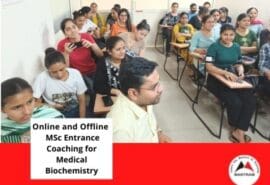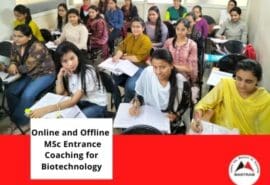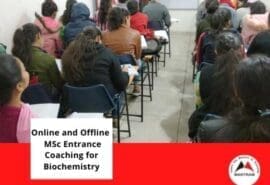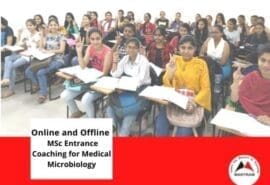
NTA UGC JRF NET Public Administration
NTA UGC JRF NET Public Administration
The National Eligibility Test (NET), also known as UGC NET or NTA-UGC-NET, is conducted by the National Testing Agency (NTA) on behalf of the University Grants Commission (UGC) to determine the eligibility of Indian national candidates for the post of Assistant Professors and award JRF (Junior Research Fellowship).
UGC NET Public Administration paper aims to gauge the teaching/research aptitude of the candidates in specialized domains of public administration.
This guide will look at the exam pattern, eligibility, syllabus, books, and preparation strategies for cracking the NTA UGC NET Public Administration exam.
For CSIR NET Life Science Exam Preparation Coaching, contact us at Mantram Study Group, SCO No. 80-81, First Floor, Sector 15-D, Chandigarh (Near Gate No. 2, Panjab University Chandigarh – Contact – 9779797575/ 9463049859)
NTA UGC NET Public Administration: Highlights
Let's first understand the key details regarding the UGC NET Public Administration exam:
- Conducting Body: NTA on behalf of UGC
- Exam Level: National Eligibility Test
- Exam Mode: Online (CBT mode)
- Exam Duration: 3 hours
- Question Type: Multiple Choice Questions
- Negative Marking: No
- Number of Papers: 1
- Maximum Marks: 300
NTA UGC NET Public Administration: Eligibility
To appear for NTA UGC NET in Public Administration subject, an applicant must fulfill the following eligibility criteria:
Post-graduation in Public Administration or allied disciplines with a minimum of 55% marks (50% for reserved category candidates)
Candidates in their final year of Master's program are also eligible to apply
NTA UGC NET Public Administration: Exam Pattern
The NTA UGC NET Public Administration exam paper will consist of two sections:
Section I - 50 compulsory MCQs of 2 marks each, Total 100 Marks
Section II – 100 MCQs, out of which any 50 to be attempted, 2 Marks per question; Total 100 Marks
No negative marking scheme is applicable in the exam. Questions are designed to analyze an in-depth conceptual understanding of public administration topics.
NTA UGC NET Public Administration: Syllabus
The UGC NET Public Administration syllabus includes topics covering various theories, concepts, and case studies from the major sub-domains:
- Principles of Public Administration
- Administrative Theory
- Comparative Public Administration
- Development Administration
- Public Policy
- Administrative Law & Ethics
- Financial Administration
- Personnel Administration
- Organization Theory & Behavior
NTA UGC NET Public Administration: Best Books
Given below are some of the best books for NTA UGC NET Public Administration paper suggested by toppers and experts:
- Unique Guide for UGC - NET Public Administration by Pradip Kumar Sahoo
- Trueman's UGC NET Public Administration Guide by KVS Madaan
- A Comprehensive Guide for NTA UGC NET Management by Paramjeet Singh
- Public Administration: Theory and Practice by Sharma & Sadana
- Public Administration in India: Theoretical and Applied Perspectives by S.N. Prasad
NTA UGC NET Public Administration: Study Plan
Here is a sample 6-month strategic NTA UGC NET exam study plan:
Month 1: Thoroughly study Basic Principles of Public Administration
Month 2: Cover Administrative Theory, Development Administration
Month 3: Public Policy, Comparative Public Administration
Month 4: Administrative Law, Personnel Administration
Month 5: Organization Theory, Financial Administration
Month 6: Revision, Mock Tests
NTA UGC NET Public Administration: Preparation Tips
Experts recommend the following preparation strategies for cracking NTA NET Public Administration:
- Study from the latest edition of recommended guidebooks
- Revise using comprehensive notes for quick recall
- Practice previous years' question papers
- Take online mocks for self-evaluation
- Read magazines like Yojana Kurukshetra for current affairs
- Improve reasoning, numerical, and mental ability
- Work on time management during mocks
Conclusion
The NTA UGC NET is a prestigious exam that opens up lecturership and research roles for Public Administration postgraduates in India.
An aspirant can improve their chance of cracking this eligibility test by adopting a strategic 6-monthly preparation approach encompassing all key facets of the vast syllabus and regularly revising & taking mock-through guidebooks.
FAQ
How many students get JRF in public administration?
Understanding JRF in Public Administration
The prime objectives of the JRF scheme are to provide research opportunities to meritorious postgraduates in specialized domains like public administration and financially support their doctoral and post-doctoral research work in various universities under professor supervision. It is among the most prestigious fellowships in India.
Analyzing Past Trends
As per statistics, only the top 1-3% of candidates who take the UGC NET public administration exam qualify for the JRF fellowship. In numerical terms:
In the 2021 December attempt, only 78 candidates out of a total of 28,000 qualified for JRF – top 0.28%
In the 2021 June attempt, 105 candidates qualified out of 35,000 – top 0.3%
In the 2020 December attempt, 68 candidates qualified out of 22,000 – top 0.31%
This data reveals that in every attempt, only around the top 0.3% or 100-125 candidates receive JRF in public administration due to high competition. The numbers translate to a minuscule fraction of serious aspirants.
Key Reasons Behind Low Numbers
Some of the reasons behind such low number of selections are:
- High cut-offs – 170+ marks out of a total of 300
- Increasing competition with more specialized aspirants
- Limited fellowships available across central universities
- Emphasis on selecting candidates for teaching roles over research profiles
Strategies to Improve Chance
Experts, however, believe that by following smart preparation strategies, serious aspirants can improve their likelihood of securing the JRF:
- Completing the entire syllabus from updated study material
- Rigorously practicing previous papers
- Writing 30+ mock tests, scoring 180+ marks
- Focusing on current affairs knowledge improvement
- Identifying strong and weak areas through self-analysis
To conclude, while the number of JRFs in public administration remains low, adopt a well-planned approach and aim to finish among the top scorers. Stay persistent in your preparation efforts.
What is the UGC NET exam for public administration?
The UGC NET exam for public administration subject is taken by postgraduates of public administration, political science and allied disciplines to qualify for teaching jobs and research fellowship roles in Indian universities and colleges.
Some key details regarding the public administration paper in the UGC NET exam are:
Conducting Body: NTA on behalf of UGC
Exam Level: National Eligibility Test
Exam Duration: 3 hours
Number of Papers: 1 (Comprising 2 sections)
Type of Questions: Multiple Choice Questions
Maximum Marks: 300 marks
Negative Marking: No negative marks
Held twice every year - June and December
UGC NET Public Administration Exam Pattern
The NTA UGC NET public administration paper pattern consists of two sections:
Section I - Compulsory 50 MCQs carrying 2 marks each, a total of 100 Marks
Section II – Attempt any 50 out of 100 MCQs, each worth 2 marks. Total 100 Marks.
The entire duration is 3 hours. Questions are designed to test conceptual knowledge as well as analytical skills.
Syllabus for Public Administration Paper
Some key areas covered in the public administration UGC NET paper as per the latest syllabus are:
- Principles of Public Administration
- Development Administration
- Comparative Public Administration
- Public Policy, Law and Ethics
- Financial and Personnel Administration
- Organization Theory and Behavior
- Current Affairs and Case Studies
Is public administration good for UPSC?
The 2 years master's program in public administration focuses on various theories, concepts, and practical case studies related to functioning government processes, policies, and administrative machinery.
Key topics covered are:
- Principles of Public Administration
- Development Administration
- Public Policy Formulation and Analysis
- Financial Administration
- Administrative Law and Ethics
- Complementing UPSC Prelims Preparation
Since public administration post-graduation extensively covers the government, government, and administration topics, which are an integral part of the UPSC preliminary exam general studies syllabus, the conceptual understanding and analytical perspective gained during the course greatly aids in preparation.
It strengthens the grip over polity, governance, budgeting, and policy-making, which often pose challenges for many IAS aspirants. Writing term papers improves writing skills.
Relevance for UPSC Mains
In the UPSC civil services mains exam, public administration is an optional subject. The public administration post-graduation course equips students with the essential knowledge and evaluative abilities to analyze policies and social issues and write perspectives demanded in the UPSC main public administration optional paper and interview round.
Since public administration is an applied discipline, the practical insights into the administrative machinery help link the theory to real scenarios in governance.
Developing Desired UPSC Aptitude
In-depth public administration learning builds precisely the kind of administrative, managerial, and problem-solving outlook that the UPSC exam intends to test among aspirants through its three-stage examination process culminating with the personality test interview.
However, public administration postgraduates should strengthen their general studies and current affairs knowledge with a focused plan to balance their preparation.
Who is eligible for net public administration?
As per the latest UGC notification, to be eligible to appear for NTA-UGC-NET public administration subject, an applicant must compulsorily hold a master's degree in public administration or allied domain like political science, economics, sociology, social work, management, etc., from any UGC-recognized Indian university.
Final year postgraduate students whose result is awaited can also apply for subject to meet this criterion. Any other degree like graduation, MPhil, or diploma does not fulfill the basic eligibility.
Minimum Percentage Criteria
Apart from holding a master's degree, UGC has also set a minimum percentage threshold in post-graduation to apply for public administration papers in NTA UGC NET, which are -
- 55% aggregate marks for general/unreserved category candidates
- 50% aggregate marks for reserved SC, ST, OBC, and PwBD categories
- No Age Limit
Another positive aspect regarding the UGC NET public administration eligibility is that there are no stringent age limits or restrictions.
Fresh postgraduates and working individuals from any age group fitting the above master percentage criteria can appear for the NTA UGC NET to become assistant professors or attempt for JRF at their own convenience.
UGC Norms Relaxed for Some Categories
Certain sections, like the third gender category, applicants with a postgraduate degree from foreign universities, and candidates with additional PG degree/diploma in public administration and allied disciplines have relaxation in percentage norms.
Essential Documents Required During Form Filling
While filling out the online application form, keep scanned copies of essential academic testimonials ready for upload, which would be required to substantiate the eligibility claims such as:
- Marksheets of all semesters of post-graduation degree
- Provisional pass certificate showing aggregate percentage score
- Post-graduation degree certificate
- Category certificate (if applying under reserved quota)
Who is eligible for a Ph.D. in public administration?
The fundamental requirement to be eligible for admission to a Ph.D. in public administration is holding a post-graduation degree specializing in public administration subject.
Many universities also consider allied post-graduation domains like political science, economics, sociology, public policy, social work, management etc. Relevant work experience is an added advantage.
Some prominent institutes offering Ph.D. programs in public administration are Jawaharlal Nehru University, Delhi University, IGNOU, Jamia Millia Islamia, and Madras University, where admission is highly competitive.
UGC NET or SET Qualification
Almost all universities made it mandatory for candidates to have qualified for the National Eligibility Test (NET) conducted by UGC or State Level Eligibility Test (SET) in public administration subject to apply for direct admission without an entrance test for the Ph.D. program.
The NET/SET eligibility ensures that only candidates with an advanced conceptual understanding of the domain and research aptitude are selected for the doctoral program focusing extensively on research skills development.
Those without NET/SET scores also can't avail of JRF scholarship benefits.
Minimum Percentage in Post-graduation
Along with the NET/SET tag, most central and state universities have set the following minimum percentage criteria in post-graduation for Ph.D. public administration eligibility:
- General and OBC categories – 55% aggregate marks
- SC/ST/PWD categories – 50% aggregate marks
This cut-off ensures the selection of deserving candidates with a strong academic record for a rigorous research-oriented doctoral program that requires analytical acumen.
Additional Requirements
Besides the above essential qualifications, certain varsities might ask for other test scores like:
- UGC/CSIR JRF certificate
- Qualifying scores in entrance tests like JNUEE, IGNOU, RET
- GATE/CAT/CMAT scores for management postgraduates
- Relevant work experience certificates
- No Objection Certificate if the applicant is employed
- Research proposal
Thanks for visiting our website Mantram Study Group
You may also join Mantram for NORCET Coaching
CHECK OUR OTHER LINKS: -



Testimonials...
Why Join NTA UGC JRF NET Public Administration









